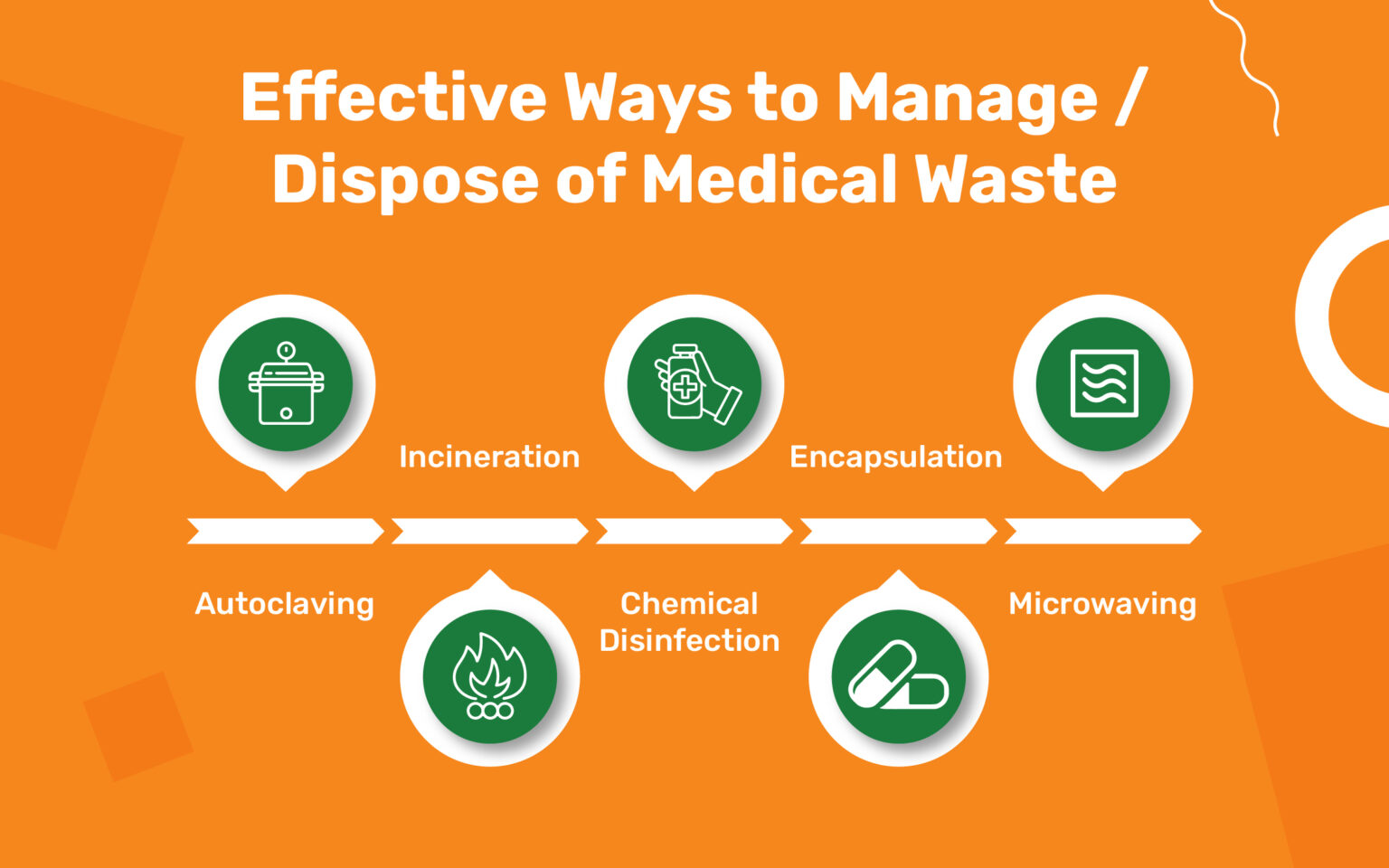Medical Waste Removal Mastery: Where Service Excellence Satisfies Health And Wellness Requirements
Medical Waste Removal Mastery: Where Service Excellence Satisfies Health And Wellness Requirements
Blog Article
Decreasing Risks and Protecting Public Health: The Function of Medical Garbage Disposal
In today's globe, where public wellness concerns are frequently rising, the correct management and disposal of clinical waste play a crucial role in reducing risks and protecting the well-being of communities. As medical facilities generate a considerable amount of waste that can possibly position major wellness and environmental risks, it comes to be critical to understand the value of implementing efficient approaches for its secure handling. In this discussion, we will certainly explore the dangers related to insufficient clinical waste administration, look into the laws and standards that govern its disposal, and highlight the benefits of taking on risk-free practices. By diving into this topic, we will certainly reveal the pivotal duty medical garbage disposal plays in securing public wellness and the environment.
Significance of Appropriate Clinical Garbage Disposal
Appropriate medical garbage disposal is of utmost significance in ensuring the safety of medical care workers and the public. medical waste disposal services with WasteX. Clinical waste, that includes things such as utilized needles, syringes, polluted products, and pharmaceutical waste, postures significant health dangers if not disposed of correctly
The primary factor for correct medical garbage disposal is to avoid the transmission of infectious conditions. Medical care workers are especially susceptible to having and spreading diseases via direct exposure to polluted waste. By implementing suitable disposal approaches, such as making use of puncture-resistant containers and making sure the right partition of different types of waste, the risk of infection can be decreased.
Additionally, proper clinical waste disposal is crucial for protecting the setting. Some clinical waste contains dangerous chemicals and materials that can pollute dirt and water resources otherwise managed appropriately. This contamination can have lasting effects on communities and public health and wellness. By adhering to details standards and policies for waste disposal, we can avoid these hazardous compounds from getting in the setting and creating damage.
Along with protecting human health and the environment, proper clinical waste disposal additionally contributes in preserving the reputation and trust of health care organizations. Proper disposal practices demonstrate a dedication to security and expertise, which is necessary for keeping public confidence in healthcare solutions.
Dangers Connected With Inadequate Medical Waste Administration
Insufficient medical waste monitoring positions significant risks to public health and wellness and the setting. Improper disposal of clinical waste can cause the spread of transmittable conditions, contamination of water sources, and the release of harmful chemicals into the setting. One of the main dangers related to insufficient medical waste administration is the transmission of infections. When medical waste, such as used syringes or contaminated dressings, is not disposed of effectively, it can come right into contact with people, resulting in the spread of illness such as HIV, hepatitis B, and consumption.
Another risk is the contamination of water resources. Incorrect disposal of clinical waste can cause the launch of dangerous chemicals and pathogens into water bodies, infecting the supply of water and posturing a risk to both animal and human health. This contamination can happen via the improper disposal of pharmaceuticals or the discharge of unattended medical waste into water bodies.
Additionally, poor medical waste monitoring can lead to the launch of poisonous chemicals into the atmosphere. Numerous clinical items have harmful materials, such as mercury, lead, or radioactive products. If these materials are not thrown away effectively, they can seep right into the dirt or water, presenting a threat to environments and human wellness.

Efficient Techniques for Medical Waste Handling
Applying reliable and safe techniques for the handling of medical waste is crucial in making sure the protection of public health and wellness and the setting. Medical waste, such as sharps, infected products, and drugs, can posture considerable threats otherwise handled properly. To mitigate these threats, medical care centers need to adopt effective methods for medical waste handling.
Proper partition entails dividing different kinds of waste at the point of generation. Medical care facilities ought to give clear standards and training to team on exactly how to set apart waste appropriately.
Clinical waste ought to be saved in puncture-resistant and leak-proof containers that are labeled suitably. Regular examinations and maintenance of these containers are required to guarantee their integrity.
Appropriate documents is additionally essential for efficient clinical waste handling. Health care centers ought helpful hints to maintain accurate records of the kind and quantity of waste created, as well as the disposal approaches made use of. This documents helps in monitoring and monitoring waste administration practices, ensuring compliance with laws, and recognizing locations for enhancement.
Lastly, healthcare facilities must develop clear protocols for the transportation and disposal of clinical waste. This consists of collaborating with licensed and trustworthy waste management business that comply with correct handling, therapy, and disposal treatments. Normal audits and evaluations ought to be conducted to verify conformity with laws and sector finest techniques.

Regulations and Standards for Clinical Garbage Disposal
To guarantee the find this correct and risk-free administration of clinical waste, health care centers should stick to guidelines and laws developed by pertinent authorities. These policies and guidelines are implemented to protect public wellness, avoid ecological contamination, and lessen the danger of transmittable conditions.
In several countries, such as the USA, the administration of medical waste goes through strict regulations applied by federal government firms such as the Epa (EPA) and the Occupational Security and Wellness Administration (OSHA) These laws outline the demands for the segregation, packaging, labeling, storage, transport, and disposal of clinical waste. medical waste removal. They additionally provide guidelines on using personal protective tools (PPE) and the implementation of infection control steps
Medical care centers are needed to create and apply comprehensive medical waste monitoring prepares that address all aspects of waste handling. These plans must include treatments for waste segregation, using ideal containers, worker training on waste administration practices, and normal tracking and auditing of waste handling procedures.
Furthermore, health care facilities have to keep precise records of their waste management activities and guarantee that waste disposal is performed by qualified and authorized waste monitoring firms (medical waste disposal services with WasteX). Non-compliance with these regulations can lead to penalties, fines, and legal repercussions
Advantages of Safe Medical Garbage Disposal for Public Health And Wellness
Correct adherence to policies and guidelines for medical garbage disposal not just makes sure the secure monitoring of waste but additionally provides considerable benefits for public wellness. The safe disposal of clinical waste medical waste disposal services with WasteX plays a vital function in preventing the spread of infectious illness and shielding the well-being of health care workers, people, and the general public.
One of the major benefits of safe clinical waste disposal is the reduction of disease transmission. Clinical waste, such as made use of needles and polluted products, can nurture transmittable pathogens that pose a major risk to human wellness.
Additionally, secure medical waste disposal additionally aids to minimize environmental air pollution. Incorrect disposal of medical waste can result in the contamination of air, dirt, and water, which can have harmful results on communities and public health. By complying with proper disposal protocols, the danger of environmental contamination is minimized, making certain the health of both human beings and the environment.
In enhancement, correct clinical waste disposal practices likewise add to the total performance and sustainability of medical care systems. By applying safe disposal techniques, medical care facilities can reduce the threat of crashes, injuries, and infections amongst their staff, bring about boosted productivity and minimized medical care costs.
Verdict
In verdict, guaranteeing appropriate medical waste disposal is crucial for lowering risks and securing public health. By applying secure clinical waste disposal practices, we can safeguard public health and wellness and create a healthier setting for all - medical waste removal.
In today's globe, where public health issues are continuously on the surge, the correct monitoring and disposal of medical waste play an essential role in minimizing dangers and protecting the well-being of areas. By diving into this topic, we will reveal the crucial duty medical waste disposal plays in protecting public wellness and the environment.
Incorrect disposal of medical waste can lead to the launch of hazardous chemicals and virus right into water bodies, polluting the water supply and positioning a threat to both animal and human health.In conclusion, making sure correct clinical waste disposal is essential for decreasing dangers and safeguarding public health and wellness. By executing risk-free clinical waste disposal methods, we can protect public wellness and produce a much healthier setting for all.
Report this page